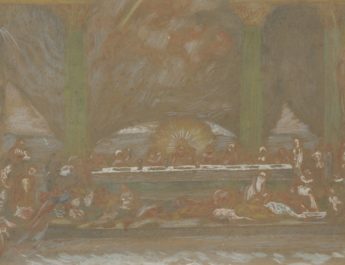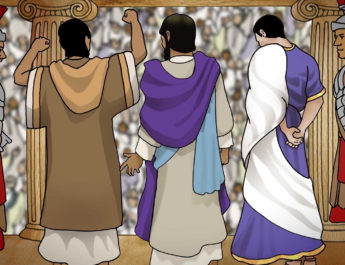Acts 1:15-17
Eastertide B25
15 In those days PeterA stood upB among the believersC (together the crowdD numbered about one hundred twenty persons)E and said,
A “Peter” = Petros. Related to petra (large rock that is connected and or projecting like a rock, ledge, or cliff; can also be cave or stony ground). This is Peter, a stone, pebble, or boulder.
B “stood up” = anistemi. From ana (upwards, up, again, back, anew) + histemi (to make to stand, place, set up, establish, appoint, stand by, stand still, stand ready, stand firm, be steadfast). This is to raise up, rise, appear. It is to stand up literally or figuratively. Can also mean to resurrect.
C “believers” = adelphos. From a (with, community, fellowship) + delphus (womb). This is a brother in a literal or figurative sense. It is also used of another member of the Church.
D {untranslated} = onoma. May be from ginosko (know, recognize, learn from firsthand experience). This is a name, authority, cause, character, fame, reputation. The name was thought to include something of the essence of the person so it was not thought to be separate from the person.
E Literally “and the number of names together was the same as about 120.”
16 “Friends,F the scriptureG had toH be fulfilled,I
F “friends” = aner + adelphos. Aner is man, male, husband, or fellow. It can also refer to an individual. Adelphos is the same as “believers” in v15. See note C above.
G “scripture” = graphe. From grapho (to write). This is literally writing, a document. In the New Testament, this is always used for scripture.
H “had to” = dei. From deo (to tie, bind, compel; declare unlawful). This is what is necessary or proper. It is what is needed or what one should do – a duty or something inevitable. This refers to something absolutely necessary.
I “fulfilled” = pleroo. From pleres (to be full, complete, abounding in, occupied with). This is to fill, make full or complete. Properly, this is filling something up to the maximum extent that it can be filled – an appropriate amount for its individual capacity. So, this is used figuratively for furnish, influence, satisfy, finish, preach, perfect, and fulfill.
which the HolyJ SpiritK throughL DavidM foretoldN
J “Holy” = Hagios. From hagnos (holy, sacred, pure ethically, ritually, or ceremonially; prepared for worship, chaste, unadulterated, pure to the core; undefiled by sin; figurative for innocent, modest, perfect). God is totally different from humanity and thus set apart. That which is consecrated to worship God (elements of worship) or to serve God (as the saints) are holy because they are now set apart for God’s purposes. Holy because important to God. This is sacred physically, pure. It can be morally blameless or ceremonially consecrated.
K “Spirit” = Pneuma. From pneo (to blow, breath, breathe hard). This is wind, breath, or ghost. A breeze or a blast or air, a breath. Figuratively used for a spirit, the human soul or part of us that is rational. It is also used supernaturally for angels, demons, God, and the Holy Spirit. This is where pneumonia comes from.
L {untranslated} = stoma. Perhaps from tomoteros (sharp, keener); from temno (to cut). This is mouth, speech, language, the tip of a sword, an opening in the ground.
M “David” = Dauid. From Hebrew David (David); from the same as dod (beloved, love, uncle); the root may mean to boil, which is used figuratively to describe love. So, this implies someone you love such as a friend, a lover, or a close family member like an uncle. David’s name likely means something like “beloved one.”
N “foretold” = proepo. 1x in NT. From pro (before, first, in front of, earlier) + epo (to answer, bring word, command). This is to say before, predict, foretell.
concerning Judas,O who becameP a guideQ for those who arrestedR JesusS—
O “Judas” = Ioudas. From Hebrew Yehudah (Judah, son of Jacob, his tribal descendants, a name for the southern kingdom. Literally, it means praised); probably from yadah (to throw one’s hands into the air in a gesture of praise); from yad (hand). This is Judah or Judas, meaning praised.
P “became” = ginomai. This is to come into being, to happen, become, be born. It can be to emerge from one state or condition to another or is coming into being with the sense of movement or growth.
Q “guide” = hodegos. 5x in NT. From hodos (way, road, path, or journey; can imply progress along a route) + hegeomai (to think, suppose, have an opinion; to lead the way, what comes in front or first, initial thought, high esteem or authority; one who commands in an official capacity); {from ago (lead, bring, carry, drive, go)}. This is leader or guide. It can be used figuratively for a teacher.
R “arrested” = sullambano. 16x in NT. From sun (with, together with) + lambano (active acceptance/taking of what is available or what has been offered; emphasizes the choice and action of the individual). This is to take, take part in, conceive, help. It can also be clasp or seize as to arrest or take hold of someone.
S “Jesus” = Iesous. From Hebrew Yehoshua (Joshua, the Lord is salvation); {from YHVH (proper name of the God of Israel; the self-existent and eternal one); {from havah (to become) or from hayah (to come to pass, become, be)} + yasha (to deliver, defend, help, preserve, rescue; properly, to be open, wide or free, which implies being safe. So, in a causative sense, this is to free someone)}. This is Jesus or Joshua in Greek – the Lord saves or the Lord is salvation.
17 for he was numberedT among us and was allottedU his shareV in this ministry.”W
T “numbered” = katarithmeo. 1x in NT. From kata (down, against, according to) + arithmeo (to number of count); {from arithmos (a number or total that has been counted to together); from airo (to raise, take up, lift, remove)}. This is to number with, count, reckon together.
U “allotted” = lagchano. 4x in NT. This is to choose by lot, to receive, determine.
V “share” = kleros. 12x in NT. Perhaps from klero (casting a lot) or from klao (to break in pieces as one breaks bread). This lot, portion, heritage. It is that share assigned to you. It could also refer to a lot used to determine something by fate, chance, or divine will.
W “ministry” = diakonia. Perhaps from dia (through, across to the other side, thoroughly) + konis (dust) OR from dioko (to chase after, put to flight; by implication, to persecute or to purse like a hunter after its prey; this can be earnestly pursue or zealously persecute) {related to dio (put to flight)}. This is service, ministry, attending someone, service. It can mean serving someone at a table or otherwise as their servant/slave. It is also used for people who serve/minister in temples, as well as the work of Christian ministry. Figuratively, this word can mean money given for charity. This shares a root with “deacon” and is where the word “diaconate” comes from.
Image credit: “The Holy Spirit Comes” by Lambsongs – Jill Kemp & Richard Gunther.




